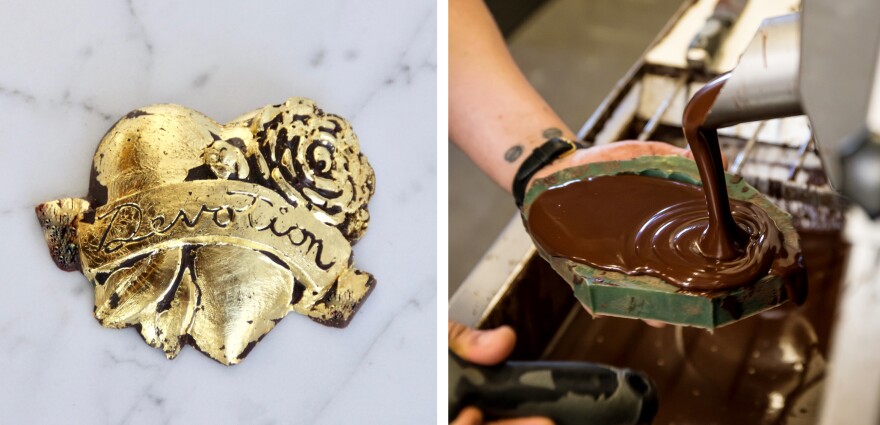When Egyptologist Howard Carter opened King Tutankamun's tomb in 1922, the first thing he saw was, "Gold – everywhere the glint of gold," according to his diaries. Unlike silver or iron, gold neither corrodes nor tarnishes. There are few more recognizable signs of wealth than to take everything you own and cover it with gold.
Both France's Palace of Versailles and President Donald Trump's walls and furniture and doors are gilded with it. Guests at Trump's penthouse might grab a candy out of a solid gold dish or sip their breakfast orange juice from a gilded cup. Whether jewelry, household items or architecture — humans have found a way to plate it with gold. Not even food has managed to escape our obsession with this precious metal.
Though decorative gold ranges from 10 to 24 karats — a measurement that tells the purity of gold versus other metals in the substance — it must be 23 or 24 karats by law to be edible. In this nearly 100-percent pure form, gold is biologically inert and can pass through the body without being absorbed.
Because gold is tasteless, odorless, devoid of nutritional value, impermanent (when used in edible form) and quite valuable, there's no better marker of wealth and power than putting it in your mouth. A 13th-century book of royal household expenses cataloged a payment for "four hundred and a half of eggs" that were boiled, painted and covered with gold leaf. In Melitta Weiss Adamson's book, Food in Medieval Times, she writes of gilded piecrusts, fowl with gold-layered heads and feet, and even animals that were so thoroughly leafed they were as much statuary as main course. In Italy, gold was so frequently consumed at noble feasts that the city of Padua had to limit its use to one or two courses or else face a city-wide gold shortage.
"It takes something ordinary and makes it extraordinary," says Lynn Neuberg, director of the food and beverage product line at Easy Leaf, a company that makes metallic leaf — gold in particular.
Though sales of edible gold leaf have been fairly steady since starting the line in 2004 (the company has been making decorative gold leaf for 60 years), Neuberg says there's been a significant jump in the past year. "I think it's a matter of chefs and pastry chefs and bar chefs wanting to be more creative," she explains. "Everyone wants to call attention to the beautiful cocktail they've created or their beautiful soup or beautiful sushi they're wrapping in gold." And with gold, a little bit goes a long way.
In general, the days of conspicuous consumption may be dying along with McMansions, but in America and abroad, the tradition of edible gold is still bright. Many restaurants, likely for publicity, have created a dish of newsworthy expense featuring gold. In 2012, a New York City food truck sold a $666 "douche burger" that wrapped truffles, lobster, caviar and a beef patty inside six sheets of gold leaf. Margo's Pizzeria on the Mediterranean island of Malta sells a pizza for nearly $2,000 that has 100 grams of white truffle and, you guessed it, gold. Last year, even Pizza Hut had its own golden ticket — a Super Bowl promotion in which a limited number of garlic-knot pizzas came crusted in gold leaf.

New York City's Serendipity 3 is home to multiple extravagant dishes featuring edible gold. A gold-leaf grilled-cheese sandwich, hamburger, and a special-edition $25,000 sundae have all won Guinness World Records for "most expensive" dish in their categories. Their "Golden Opulence" sundae (a steal at just $1,000), is covered in $50- to $100-worth of edible gold, according to the restaurant's creative chef, Joe Calderone. "It's over the top, but we also call it an edible work of art," he says. He believes that the look of gold, rather than its value, is what makes it such a coveted ingredient. "If gold leaf were a penny-a-sheet, it would still be beautiful and I would still use it."
While these dishes are all more "publicity stunt" than "fine dining," there are some people working with edible gold who truly let its artistic qualities shine through. Alma chocolate in Portland, Ore., is best known for its original line of icons – such as the Virgin of Guadalupe or the Hindu deity Ganesha — rubbed with gold. It would be easy to mistake them for pounded-tin folk art from Mexico instead of chocolate. Alma's founder, Sarah Hart, had to learn both the art of making chocolate and gilding food when she first started crafting these edible icons. She says it's a painstaking process: "People don't understand the labor intensity and the time to make them. To gild each one takes 10 to 15 minutes."
In some ways, the beauty of these chocolates has backfired. "People often don't even eat them," Hart says.
Recently she got a note from a customer who had purchased a chocolate for her mother five years ago. The woman's mother had placed it on her home altar, where the daughter found it after her mother died. "She took a picture and sent it to me," Hart says. The chocolate — still gold but slightly less edible after five years — was pristine.
Tove K. Danovich is a journalist based in Portland, Oregon.
Copyright 2021 NPR. To see more, visit https://www.npr.org.

